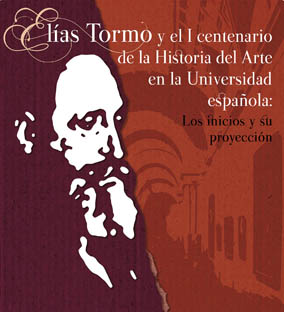
The Faculty of Geography and History hosts, on 9 and 10 December, the seminar 'Elías Tormo and the centenary of the History of Art at the Spanish University: The beginnings and its projection', under the direction of Luis Arciniega, responsible Department of Art History at the University of Valencia. At the same time it will be inaugurated several exhibition panels sponsored by the Office of the Vice‐Principal for Territorial Projection and Participation.
In 2013 the centenary of the name 'Art History' in the Spanish university education is met. This discipline, which was consolidated in the European university area since the mid-nineteenth century concomitantly to the notion of heritage, was introduced into the Spanish university in the early twentieth century. Specifically, in 1904 on a voluntary basis in the doctorate of Arts and History of Central University, under the chair of History of Fine Arts, which won Elías Tormo i Monzó (Albaida, 1869 - Madrid, 1957), and in 1913, by a proposal to the cloister of the Faculty of Arts was renamed as of Art History, as part of the History section of this faculty. A root that today has reached more than twenty Spanish universities where Art History is taught.
These seminar and exhibition begin a series of actions that address the multifaceted and interesting figure of Elias Tormo, graduate of the University of Valencia, full-university professor, dean, vice-principal and principal of the Central University, member of the Centre for Historical Studies, the board of the Prado Museum, the royal Academies of Fine Arts and History, the Parliament and the Senate, Minister of Public Instruction and Fine Arts, and constant contributor to the Valencian press.
Moreover, with the perspective of the analysis of the origins, it proposes that this meeting will serve to open a debate on the reality of art history today: its university education, research methodology, social dimension, etc, and its prospect.
Registration and support
Registration is free, because it has the funding collaboration of various institutions: CEHA (Spanish Committee of Art History), CIVHA (Interuniversity Valencian Council for Art History), Cañada Blanch Foundation, Institut d'Estudis de la Vall d 'Albaida (ENPI) and University of Valencia. In addition, San Juan Foundation of Valencia Hospital, the Royal College of Corpus Christi in Valencia and the Complutense University of Madrid have also collaborated.
Last update: 4 de december de 2013 10:58.
News release


















